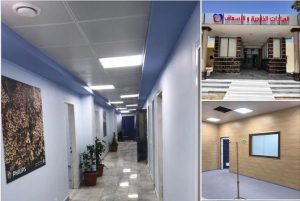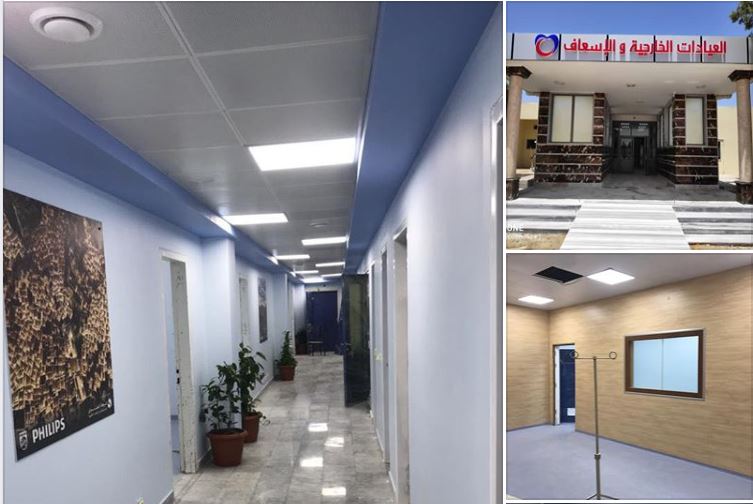By Sami Zaptia.

London, 28 August 2019:
In an open letter on Tuesday by the Tripoli Ministry of Health addressed to the Libyan public, the first of its kind by a senior health official the Ministry claims, the Deputy Minister Mohammed Haitham Issa accepted the responsibility of the Ministry to grant all Libyan citizens their ‘‘legitimate rights to a full health services’’.
The letter, entitled “Outstanding Projects on the Way to Completion,” referred to the resumption of numerous hospital maintenance projects nationwide, some of which were discontinued more than a decade ago, adding that ‘‘low-income people are legally covered by the right to health care and free education’’.
It added that health does not mean that these services lack the basics and standards of quality and that the current government is determined to change this impression and these sterile rules.
‘‘Our goal is to achieve social justice among all segments of society. We will seek that the simple citizen receives the best services and there will be no difference between the simple citizen and those who have the ability to buy health services from the private sector’’, he said.
The Deputy Minister revealed the “significant” difficulties faced in reforming the health sector, saying: “We faced the major resistance and those who doubted that we could reach the goal. We also faced those who were afraid of taking responsibility for the delinquents to sleep and escape. But we have made our intention and determination clear to reach the goal and achieve what we can with a collective, structured institutional effort based on short, medium and long-term plans, and it is no exaggeration to say that we have confronted those who deliberately obstructed any successes.”
“Slogans without real content will not provide any result for the citizen, but what will happen radically at all levels is the real response and great motivation, while recognizing that many aspects need more effort, perseverance and strategic planning, especially since they were born. Many years of negligence and apparent negligence cannot be remedied immediately.”, added the Deputy Minister.
He thanked many in the health sector for their unified efforts, but he also thanked the Audit Bureau, for fighting corruption in the health sector which helped launch the reform programme on a correct footing.
The Health Ministry then listed a number of projects it is on the verge of completing in different medical specialities.
It revealed that it would soon announce the completion of the first phase of maintenance and development projects within all hospitals in the capital Tripoli, which have not received as much attention as the hospitals are now witnessing.
Abu Sleem Accident and Emergency hospital
The completion of the processing and maintenance of the diagnostic radiology department at the Abu Sleem Accident and Emergency hospital with the latest equipment and the department to be opened within days, with the implementation of radical maintenance work within other departments of the hospital.
Zawiat Al-Dahmani Clinic
The combined clinic Zawiat Al-Dahmani will be ready in a few weeks to receive citizens as the first grouped clinic to offer a CT scan service after the ministry succeeded in resuming the implementation of the project, which has been stalled since 2009.
Burns and Cosmetic Surgery Hospital
The implementation of radical maintenance work and the processing of the Burns and Cosmetic Surgery hospital, including the second floor of the cosmetic department, which has not witnessed maintenance work since 2011, where it was equipped with a clinical capacity of 15 beds and the introduction of cosmetic care within the department equipped with the latest medical devices.
There was also the maintenance and equipping of intensive care and equipping the rooms with high quality medical glass walls characterized by three-dimensional decoration in forms symbolizing nature and implemented for the first time inside public hospitals.
Tripoli Central Hospital
Tripoli Central Hospital is witnessing major and radical maintenance of important departments including accidents, ambulance, internal ambulance, care, analysis laboratories, café, bone, organ transplantation, men’s interior and endoscopy departments.
Mitiga Hospital
Mitiga Hospital has had maintenance work carried out at the laboratory, blood bank, ambulance and emergency departments. A department for women and childbirth will be established, as well as a special section for diagnostic radiology.
Autism Rehabilitation centres
The completion of the first Autism Rehabilitation centre in Libya, under the Ministry of Health, will be announced soon, followed by the opening of other branches in the cities of western, eastern and southern Libya.
Children’s Hospital in Tripoli
The Children’s Hospital in Tripoli is also having maintenance of the entire building by removing the old building and maintaining the departments of childcare, shelter and ambulance.
The Ministry also reported maintenance work in other important facilities such as the Tripoli Reference Laboratory, the Dialysis Centre on al-Shat, and al-Razi Hospital for Psychiatric and Neurological Diseases.
The new health improvements and reforms come as part of the wider nationwide health reform programme initiated by the Faiez Serraj-led Presidency Council /Government of National Accord in October 2017.
Part of this reform process is the formation of the National Centre of Health System Reform (NCHSR) as the driver of health reform. It is the child of a long health review and reform process that started with the 2012 Tripoli health conference and its subsequent recommendations. It recommended that an autonomous health reform committee (NCHSR) be formed to carryout root review and reform of Libya’s ailing health sector.
Headed by Dr Samir Sagar, the NCHSR operates in collaboration with the Health Ministry, and sprang out of the Libya Health System Strengthening Programme (LHSS), set up between the Libyan authorities and the European Union to reform Libya’s health sector.
The NCHSR’s goals are to
· restructure the health system;
· ensure full funding for a service that is free to patients at the point of use;
· involve the private sector;
· have a healthcare service in line with international standards;
· decentralise;
· have a service where health workers, whether in the private or public sectors, are properly paid for their work;
· develop a master plan to achieve universal health care in Libya.
https://www.libyaherald.com/2017/10/02/serraj-spells-out-reforms-needed-by-libyan-healthcare-system/
https://www.libyaherald.com/2018/02/20/libyas-health-sector-reform-moving-ahead-says-head-of-committee/
https://www.libyaherald.com/2018/03/06/new-head-of-tmc-appointed-part-of-continued-health-reform-programme/
https://www.libyaherald.com/2019/06/20/five-new-e-13-million-eu-funded-projects-launched-to-support-libyan-health-sector/
https://www.libyaherald.com/2017/12/14/eu-donates-e10-9-million-for-healthcare-package/
https://www.libyaherald.com/2017/05/10/major-problems-with-libyas-health-care-services-still-in-evidence/
https://www.libyaherald.com/2017/07/15/libyan-health-service-in-crisis-and-worsening-fast-says-uns-who/
https://www.libyaherald.com/2017/04/08/eu-pledges-to-bolster-libyas-health-and-education-sectors-after-inter-ministerial-meeting/
https://www.libyaherald.com/2015/12/24/eu-to-provide-e-6-6-million-support-for-libyan-health-and-youth/







